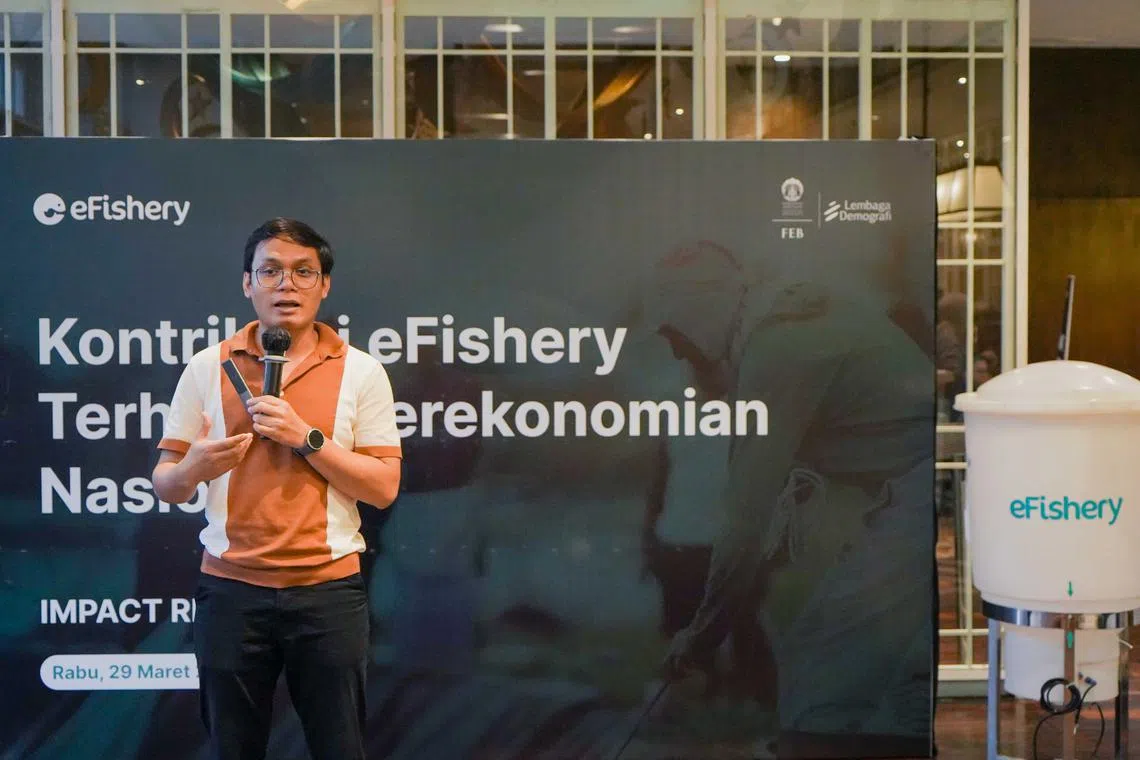Indonesia’s fisheries sector seeks greater use of AI to close technology gap
Aquatech startups, including unicorn eFishery, are coming up with new solutions to help fishermen be part of digital economy

[JAKARTA] Indonesia wants to modernise its fisheries industry – a key contributor to the economy – to better meet the rising demand for farmed seafood and claim a greater share of the US$421 billion global market.
The Ministry of Marine Affairs and Fisheries recently set an ambitious goal to export US$7.2 billion worth of fishery products by the end of 2024 – a four-fold increase from the output in 2020, the year the Covid-19 pandemic crippled the sector.
The government also plans to restore more than 300,000 hectares of idle shrimp-farming ponds in an effort to boost production. On the whole, the aim is for the fishery sector to produce as much as 30.8 million tonnes of fishery products this year.
Minister of Maritime Affairs and Fisheries Sakti Wahyu Trenggono was quoted in an Antara News Agency report in January as saying that the contribution of the fishery sector to Indonesia’s gross domestic product (GDP) this year was expected to reach 5-6 per cent.
Digitalisation push
The national effort has placed the spotlight on the aquaculture startups in the industry, many of which are making use of technology to tap on the demand.
Temasek-backed eFishery, which was founded in 2013 and has since become a unicorn, is among those using the internet-of-things, artificial intelligence (AI) and deep tech to help solve the country’s food security issues.
While many traditional farmers still manually feed the fish by hand, eFishery assists breeders with automatic feeding tools.
These feeders detect the hunger levels of fish and shrimp through their movements, which prevents the problem of over-feeding or under-feeding when the process is done manually.
The sensors can also be used to measure the temperature and humidity in the water so that the best production levels can be achieved.

eFishery’s founder and chief executive Gibran Huzaifah stressed the importance of proper feed management given that feeding accounts for 80 per cent of total production costs.
“It’s ironic that fish farming practices in Indonesia have not changed in the last 30 years, while in all other industries there have been many technological advancements,” he told The Business Times.
eFishery’s ecosystem has been used by more than 200,000 farmers in 280 cities in Indonesia. The company aims to grow this number to one million farmers by 2025.
“We had to spend a lot of time out in the field to educate and convince farmers of the benefits of technology in supporting their conventional aquaculture business,” Gibran said.
He shared that eFishery has also started to export shrimp to the US, China and India. Buyers there have the ability to trace the location of the ponds where the shrimp were farmed, the type of feed used and whether antibiotics were included, among other information.
More funding
While many tech startups have gone through a funding winter and conducted retrenchments, Indonesia’s aquaculture startups seem to have weathered the storm quite well with millions of dollars poured into the ecosystem in the past three years.
According to data from Tech in Asia, the disclosed funding for aquaculture startups increased threefold in 2022, reaching US$131.5 million compared to 2021.
Last May, eFishery completed a Series D funding round that raised US$108 million, making it the first agritech unicorn in Indonesia with a valuation of US$1.3 billion.
The company has been profitable since 2018, said Gibran, although he could not reveal any specific figures due to a non-disclosure agreement signed with his investors.
Closing the gap
Indonesia is the world’s second-largest aquaculture producer, after China, with a total output of 14.8 million tonnes in 2020, equivalent to 13.2 per cent of global production. But when it comes to exports in terms of value, Indonesia is ranked 12th in the world.
Despite the abundance of resources, Indonesia’s fishermen are also relatively poorly paid, earning less than US$84 a month. This has resulted in their numbers dwindling over the years.
Data from the government showed that there are 2.7 million fishermen in Indonesia, contributing 25 per cent to the national poverty rate.
“In a sector dominated by traditional farmers and low yields, the adoption of AI and other new technologies could reduce social and economic inequality through an inclusive digital economy,” said Liris Maduningtyas, the chief executive of aquaculture startup Jala.
Jala, a digital solution provider for the shrimp farming industry, uses technology to monitor environmental conditions and feeding data, which farmers can then adjust to maximise their yield.
Its mobile app currently has over 20,000 users, monitoring shrimp across more than 35,000 ponds. Jala raised US$13.1 million in a Series A funding round last November led by Intudo Ventures.
Another hurdle that the industry has to overcome is the fact that there are up to seven layers in the supply chain between the fishermen and the end-customer, which means almost all the profits go to the middlemen.
Indonesian startup Aruna, a supply chain aggregator for the marine and fishery industries, has created a platform that gives fishermen greater and more direct access to international buyers.
Aruna also actively works with local grocery e-commerce platforms such as Tokopedia, Bukalapak and Shopee to add fish products to their catalogues.
Decoding Asia newsletter: your guide to navigating Asia in a new global order. Sign up here to get Decoding Asia newsletter. Delivered to your inbox. Free.
Copyright SPH Media. All rights reserved.


